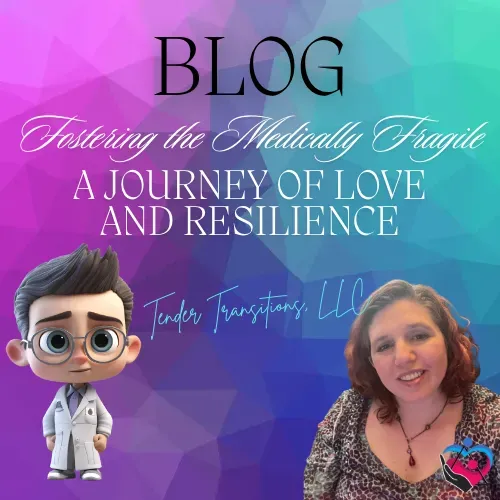Agency VS County for Medically Fragile Foster Care: Navigating Your Options
When considering fostering a medically fragile child, one crucial decision involves choosing between working with a private foster care agency or directly with a county child welfare department. Both options come with distinct advantages and challenges, especially when caring for children with complex medical needs. This blog post will explore the differences between agency and county foster care systems, helping prospective and current foster parents understand which might be the best fit for their situation.
Understanding the Basics: Agency vs. County Foster Care
Agency Foster Care:
Private foster care agencies are nonprofit or for-profit organizations licensed by the state to recruit, train, and support foster parents. These agencies often focus on providing specialized services and support tailored to the needs of the children and foster families they serve.
County Foster Care:
County child welfare departments manage the public foster care system. They are responsible for overseeing all aspects of child welfare, including foster care placement, case management, and ensuring compliance with state regulations. County foster care is typically funded by public resources and operates under state and federal guidelines.
Specialized Support for Medically Fragile Children
Agency Foster Care:
Private agencies often offer specialized programs designed to address the unique needs of medically fragile children. This can include:· Enhanced Training: Agencies may provide additional training specific to the medical needs of the children they place, ensuring that foster parents are well-prepared to handle complex health conditions.
- Dedicated Case Management: Agencies often assign case managers who have expertise in managing medically fragile cases, offering more personalized support and guidance.
- Medical Resources: Agencies may have partnerships with healthcare providers and services tailored to medically fragile children, offering easier access to specialized medical care.
County Foster Care:
County departments typically offer broader support services, but their focus may be more generalized. However, they provide:
- Comprehensive Services: County departments can coordinate a range of services and resources, including medical care, social services, and educational support, although this may vary based on the county’s resources.
- Access to Public Resources: Being part of the public system, county departments can often leverage government funding and resources for medical care and support services.
Training and Preparation
Agency Foster Care:
Specialized Training: Agencies often provide targeted training for medically fragile care, including workshops, hands-on practice, and access to experts in pediatric medicine and care.
Ongoing Support: Agencies may offer ongoing educational opportunities to keep foster parents updated on the latest medical practices and techniques.
County Foster Care:
General Training: Training through county departments tends to be more generalized, covering broad aspects of foster care rather than focusing specifically on medically fragile needs.
Additional Resources: While counties may offer basic training, foster parents may need to seek additional resources or training on their own for specialized medical care.
Case Management and Support
Agency Foster Care:
- Personalized Case Management: Agencies often provide more personalized case management services, with social workers who specialize in medical issues and can offer more tailored support.
- Direct Communication: Agencies might facilitate more direct communication between foster parents and medical professionals, ensuring that the child’s needs are promptly addressed.
County Foster Care:
- Wide-Ranging Caseloads: County caseworkers may handle larger caseloads, which can sometimes lead to less individualized attention for each case.
- System Navigation: Foster parents in county systems may need to navigate a more complex bureaucracy to access specialized services and support.
Financial Considerations
Agency Foster Care:
- Funding and Resources: Agencies often have access to additional funding sources, grants, or donations that can support specialized medical care and resources for medically fragile children.
- Reimbursement Rates: Agencies may offer different reimbursement rates compared to county systems, depending on their funding and policies.
County Foster Care:
- Standardized Payments: Counties provide standardized foster care payments based on state guidelines, which may not always account for the additional costs associated with caring for a medically fragile child.
- Public Resources: While funding may be more predictable, counties may have fewer resources available for additional support or specialized medical needs.
Navigating the System
Agency Foster Care:
- Streamlined Process: Agencies often aim to streamline the placement process and can offer more guidance and support throughout the placement and care process.
- Focused Resources: Agencies might provide additional resources and advocacy for navigating healthcare systems and accessing specialized services.
County Foster Care:
- Bureaucratic Challenges: Working with county departments may involve more bureaucratic processes, potentially leading to delays or challenges in accessing specific resources or services.
- Diverse Services: Counties offer a broad range of services, which can be beneficial but may also require more effort from foster parents to access specialized support.
Making the Choice: What to Consider
When deciding between agency and county foster care for a medically fragile child, consider the following:
- Specialization Needs: If you are seeking specialized support and training tailored to medically fragile care, a private agency might be better suited to your needs.
- Resource Availability: Evaluate the resources and support offered by both options, including financial assistance, medical care access, and case management.
- Personal Preferences: Consider your own preferences for support and communication, as well as your comfort level with navigating either system’s processes and requirements.
Conclusion
Choosing between a private foster care agency and a county child welfare department is a significant decision that can impact your experience as a medically fragile foster parent. Both options have their own strengths and challenges, and understanding these can help you make an informed choice that best supports your ability to care for a child with complex medical needs. Whether you opt for the specialized support of an agency or the comprehensive services of a county system, your dedication and commitment to providing high-quality care are paramount in making a positive difference in the life of a medically fragile child.

